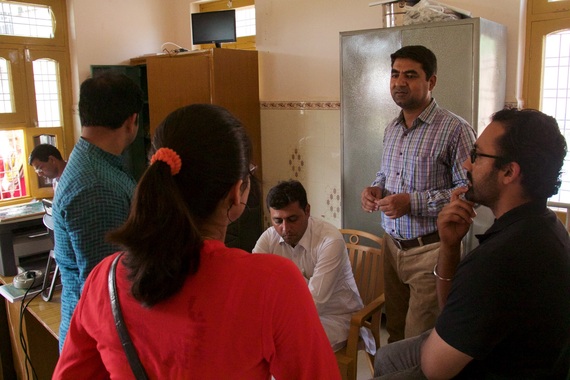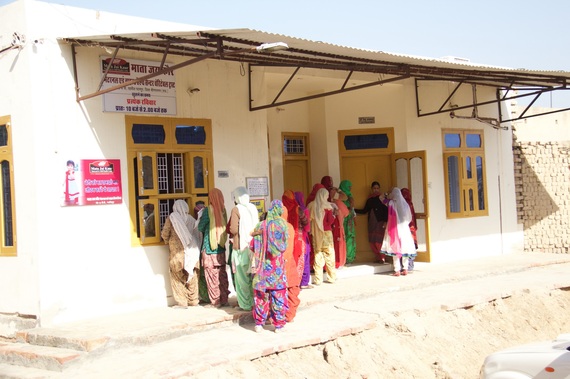One of the most clichéd phrases in India's sociopolitics is 'the silent majority', used mainly by large religious, linguistic or caste-based groups who feel wronged. Today, social media helps amplify the voices of such hitherto neglected people and groups. However, there is still a huge community in India whose voice was rarely heard in the pre-Internet era and for whom the unfortunate legacy continues even now: India's villagers. They are perhaps the most authentic 'silent majority' of our nation. Most of the voices we are exposed to -- in print media, television, the Internet -- are urban, although 69% of India lives in villages. That is 833,463,448 human beings, almost a hundred million more than Europe's entire population. Quite agonizingly for our muted villagers, we endlessly talk about 'Smart Cities', but rarely about smart villages.
Within this silent majority reside the hushed pains of its dominant minority, the rural women. Numbering 406 million, they can even be termed India's largest minority. Aneel Brar, a Canadian citizen of Punjabi origin and current student of global health at Harvard University, has been working for this minority since 2011, and helping them be heard. This article itself is the latest instance of that, as his invitation for me to visit 35BB--the village in Sri Ganganagar district of Rajasthan where he works-- opened up my ears to the cries of rural Indian women.
![2016-02-27-1456592541-3012398-AneelBrar.jpg]()
Aneel Brar (right) with his co-workers at the Mata Jai Kaur Centre
There, Aneel manages the Mata Jai Kaur (MJK) Maternal and Child Health Centre, an NGO started by his uncle, Deep Shergill. For the past five years, he has been dividing his time between north India and North America. While there are many ways to look at his inspiring story, I prefer the semi-Swades version: Western person of Indian origin making meaningful grassroots contribution to swades, even as he keeps his pardesi ties strong and intact.
The MJK Centre, which opened in late 2009, provides maternity care to women from 35BB and neighbouring villages. While 'on paper' poor rural women enjoy access to free services and medicines through the government, the implementation of that lofty ideal is highly patchy in most parts of India; this is where MJK pitches in. Aneel entered the scene in mid-2011 when Mr Shergill requested him to stay at the village for six months and help organize the Centre's work. Instead, he got so deeply involved that the six months are now on course to become five years.
![2016-02-27-1456592691-1948811-MJK1.jpg]()
Village women at the Mata Jai Kaur Centre
Deep Shergill named the Centre after his loving grandmother (Mata Jai Kaur) who took care of him when his mother passed away just a few weeks post-birth; Deep was her tenth child. A desire not to let such a fate befall any other village woman propelled him to undertake this venture. Over the years, the MJK Centre has helped thousands of women receive ante-natal checkups, pregnancy advice and consultations, iron and vitamin tablets, and skilled birth attendance. Much research in India dissects barriers to access of health services in rural areas, and MJK works well especially because it eliminates those barriers by design. What women find at the Centre are respectful staff, clean premises, absence of underhand practices, consistent availability of medicines/doctors/nurses, and completely free care at the point of use (voluntary donations are accepted).
When MJK started, less than a fifth of the women in the district received government-recommended modern pregnancy advice (as per data from the District Level Household and Facility Survey); Aneel and his wonderful team have been striving to increase that proportion, and have done well. His commitment is phenomenal: not many persons in their early 30s would leave North America and stay in an Indian village for several months a year. Abhishek Bhartia, director of Sitaram Bhartia Hospital in New Delhi and a friend of Aneel's, says, "We work for very different populations--he for rural women who often lack even basic care and I for urban women who are overwhelmed with unnecessary investigations etc. But wherever one is, working in India always gives you the satisfaction of making a greater difference."
"It's a much better life there" is what the lead character opined about America in the film Swades, echoing the sentiments of countless expatriates. How I see it, Aneel has found the rare balance between the 'better' life there and the 'more fruitful' life here. Social justice giants Amartya Sen and Paul Farmer, with whom Aneel also took a class at Harvard, inspire him immensely. While the antenatal care work is going great, he awaits more funds so that MJK can focus on maternal mental health, and a holistic approach that includes education and nutrition well beyond pregnancy. He observed that villagers generally give importance to women's health only till childbirth, after which the traditional neglect resumes, thus necessitating a broader approach. He also desires to share his research, expertise and knowledge with the government (and we hope that the government is listening!).
Providing quality health services in villages is a common challenge around the world, and Aneel Brar has been perseveringly devising solutions for half a decade now. Perhaps the silent rural majority is not really silent; maybe we urban folks, taking inspiration from Aneel, just need to sharpen our hearing a bit.
![]() Like Us On Facebook |
Like Us On Facebook |
![]() Follow Us On Twitter |
Follow Us On Twitter |
![]() Contact HuffPost India
Contact HuffPost India
Also see on HuffPost:
While there are many ways to look at his inspiring story, I prefer the semi-Swades version: Western person of Indian origin making grassroots contribution to swades...
Within this silent majority reside the hushed pains of its dominant minority, the rural women. Numbering 406 million, they can even be termed India's largest minority. Aneel Brar, a Canadian citizen of Punjabi origin and current student of global health at Harvard University, has been working for this minority since 2011, and helping them be heard. This article itself is the latest instance of that, as his invitation for me to visit 35BB--the village in Sri Ganganagar district of Rajasthan where he works-- opened up my ears to the cries of rural Indian women.

Aneel Brar (right) with his co-workers at the Mata Jai Kaur Centre
There, Aneel manages the Mata Jai Kaur (MJK) Maternal and Child Health Centre, an NGO started by his uncle, Deep Shergill. For the past five years, he has been dividing his time between north India and North America. While there are many ways to look at his inspiring story, I prefer the semi-Swades version: Western person of Indian origin making meaningful grassroots contribution to swades, even as he keeps his pardesi ties strong and intact.
The MJK Centre has helped thousands of women receive ante-natal checkups, pregnancy advice and consultations, iron and vitamin tablets, and skilled birth attendance.
The MJK Centre, which opened in late 2009, provides maternity care to women from 35BB and neighbouring villages. While 'on paper' poor rural women enjoy access to free services and medicines through the government, the implementation of that lofty ideal is highly patchy in most parts of India; this is where MJK pitches in. Aneel entered the scene in mid-2011 when Mr Shergill requested him to stay at the village for six months and help organize the Centre's work. Instead, he got so deeply involved that the six months are now on course to become five years.

Village women at the Mata Jai Kaur Centre
Deep Shergill named the Centre after his loving grandmother (Mata Jai Kaur) who took care of him when his mother passed away just a few weeks post-birth; Deep was her tenth child. A desire not to let such a fate befall any other village woman propelled him to undertake this venture. Over the years, the MJK Centre has helped thousands of women receive ante-natal checkups, pregnancy advice and consultations, iron and vitamin tablets, and skilled birth attendance. Much research in India dissects barriers to access of health services in rural areas, and MJK works well especially because it eliminates those barriers by design. What women find at the Centre are respectful staff, clean premises, absence of underhand practices, consistent availability of medicines/doctors/nurses, and completely free care at the point of use (voluntary donations are accepted).
He awaits more funds so that MJK can focus on maternal mental health, and a holistic approach that includes education and nutrition well beyond pregnancy.
When MJK started, less than a fifth of the women in the district received government-recommended modern pregnancy advice (as per data from the District Level Household and Facility Survey); Aneel and his wonderful team have been striving to increase that proportion, and have done well. His commitment is phenomenal: not many persons in their early 30s would leave North America and stay in an Indian village for several months a year. Abhishek Bhartia, director of Sitaram Bhartia Hospital in New Delhi and a friend of Aneel's, says, "We work for very different populations--he for rural women who often lack even basic care and I for urban women who are overwhelmed with unnecessary investigations etc. But wherever one is, working in India always gives you the satisfaction of making a greater difference."
"It's a much better life there" is what the lead character opined about America in the film Swades, echoing the sentiments of countless expatriates. How I see it, Aneel has found the rare balance between the 'better' life there and the 'more fruitful' life here. Social justice giants Amartya Sen and Paul Farmer, with whom Aneel also took a class at Harvard, inspire him immensely. While the antenatal care work is going great, he awaits more funds so that MJK can focus on maternal mental health, and a holistic approach that includes education and nutrition well beyond pregnancy. He observed that villagers generally give importance to women's health only till childbirth, after which the traditional neglect resumes, thus necessitating a broader approach. He also desires to share his research, expertise and knowledge with the government (and we hope that the government is listening!).
Providing quality health services in villages is a common challenge around the world, and Aneel Brar has been perseveringly devising solutions for half a decade now. Perhaps the silent rural majority is not really silent; maybe we urban folks, taking inspiration from Aneel, just need to sharpen our hearing a bit.
 Like Us On Facebook |
Like Us On Facebook |  Follow Us On Twitter |
Follow Us On Twitter | Also see on HuffPost:
















